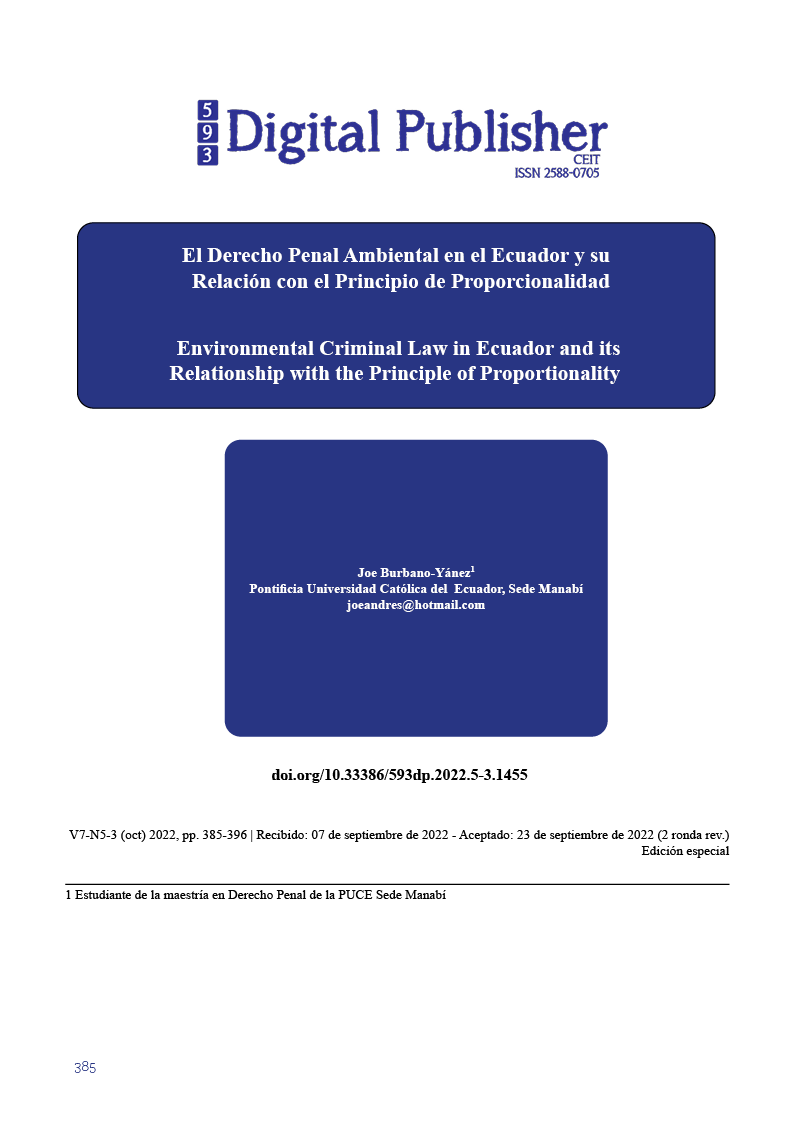Environmental Criminal Law in Ecuador and its Relationship with the Principle of Proportionality
Main Article Content
Abstract
The Constitution of 2008 has taken a 360º turn in the way of perceiving nature or Pachamama, this has ceased to be seen as an entity that exists only for the service of human beings, and on the contrary has granted it the quality of subject of law, making it guarantee comprehensive protection, as an entity that has existed long before humanity and that has the right to regeneration, respect and restoration. This new biocentric conception has forced to activate criminal law in search of the prevention, investigation and punishment of acts that attempt against this new legal good, for this, this research will analyze if the use of criminal law complies with the principle of proportionality determining if the punitive measures applied internally are suitable, necessary and proportionate; or on the contrary, other rules of a less harmful nature could apply. Likewise, the creation of a specialized prosecutor's office on crimes against nature will be suggested, which will have the ideal technical, technological and economic knowledge to identify if an environmental crime has been committed and, if necessary, act in the defense and protection of the Pacha Mama; where the life of all of us is reproduced and developed. For this purpose, the qualitative method will be used in the use of doctrine and jurisprudence, and slightly the quantitative method, with the statistical database of the Attorney General's Office.
Downloads
Article Details

This work is licensed under a Creative Commons Attribution-NonCommercial-ShareAlike 4.0 International License.
1. Derechos de autor
Las obras que se publican en 593 Digital Publisher CEIT están sujetas a los siguientes términos:
1.1. 593 Digital Publisher CEIT, conserva los derechos patrimoniales (copyright) de las obras publicadas, favorece y permite la reutilización de las mismas bajo la licencia Licencia Creative Commons 4.0 de Reconocimiento-NoComercial-CompartirIgual 4.0, por lo cual se pueden copiar, usar, difundir, transmitir y exponer públicamente, siempre que:
1.1.a. Se cite la autoría y fuente original de su publicación (revista, editorial, URL).
1.1.b. No se usen para fines comerciales u onerosos.
1.1.c. Se mencione la existencia y especificaciones de esta licencia de uso.
References
General
Arias, F. (2012). El proyecto de investigación. Introducción a la metodología científica. Editorial Episteme.
Ferrajoli, L. (2006). Derechos fundamentales y critica al derecho. Epistemología Jurídica y Garantismo
Ferrajoli, L. (2003). Pasado y futuro del Estado de Derecho. En Neoconstitucionalismos, ed Miguel Carbonell.
Roxin, C. (2006). Derecho penal. Parte general. Tomo I fundamentos. La estructura de la teoría del delito, Tomson-Civitas 43
Eco, H. (2001). Como hacer una tesis doctoral: técnicas y procedimientos de estudio, investigación y escritura. Gedisa.
Hernández, R., Fernández, C. y Baptista, P. (2003). Metodología de la investigación. Editorial Mc Graw-Hill.
Real Academia Española. (s.f.). Sojuzgar. En Diccionario de la lengua española. Recuperado el 30 de junio de 2022, de https://dle.rae.es/sojuzgar?m=form
Reina Valera .(1960). https://www.biblegateway.com/passage/?search=G%C3%A9nesis%20 1%3A28&version=RVR1960
Zaffaroni, E. (2002). Derecho Penal. Parte General, segunda edición. Ediar
Especifica
Goto, R. (2007). Reflexiones sobre la Biblia y medio ambiente recuperado el 02 de junio de 2022, de http://www.radioevangelizacion.org/spip.php?article1008
Declaración de Estocolmo: Sobre El Medio Ambiente Humano. Conferencia de las Naciones Unidas sobre el Medio Ambiente Humano. 16 de junio de 1972.
Declaración de Río de Janeiro: Sobre el Medio Ambiente y el Desarrollo. Conferencia de las Naciones Unidas sobre el Medio Ambiente y el Desarrollo. 14 de junio de 1992.
Ávila Santamaria, R. (2010) El Derecho de la Naturaleza: Fundamentos. Repositorio digital de la Universidad Andina Simón Bolívar.
Morales Naranjo, V. (2021) Los Delitos Contra el Ambiente y la Naturaleza. Corporación de Estudios y Publicaciones.
Organización de Naciones Unidas para la paz, dignidad e igualdad en un planeta sano (27 de enero de 2022). Desafíos Globales Cambio Climático. https://www.un.org/es/global-issues/climate-change.
Kierszendaum, M. (2009) El bien jurídico en el desarrollo penal, algunas nociones básicas desde la óptica de la discusión actual. Lecciones y ensayos.
Pacari N. (2009). Naturaleza y territorio desde la mirada de los pueblos indígenas. Sumak Kawsay Yuyay, p.33
Matellanes, N. (2000) Medio ambiente y funcionarios públicos. Bosch.
Silva Sánchez, J. (2007) La teoría de la determinación de la pena como sistema dogmático, un primer esbozo.
Normativa
Constitución de la República del Ecuador [Const]. Art. 76. 20 octubre del 2008 (Ecuador).
Constitución Política del Ecuador [Const]. Art. 86. 11 de agosto de 1998 (Ecuador).
Código Orgánico Integral Penal [COIP]. Ley 180 de 2014. 10 de febrero de 2014 (Ecuador).
Código Orgánico del Ambiente [CODA]. Registro oficial suplemento 983. 12 de abril de 2017 (Ecuador).
Código Penal, [CP]. Ley No.49 de 2000. 15 de febrero de 1971 (Ecuador).
Ecuador, Juez Multicompetente de Galápagos, Caso No. 20331-2017-00179, 18 de julio de 2019
Ecuador, Corte Nacional de Justicia, sentencia No.230-1S-SEP-CC, 17 de julio 2018.
Ecuador, Corte Constitucional del Ecuador, sentencia No. 13-18-CN/21, 15 de diciembre del 2021.

